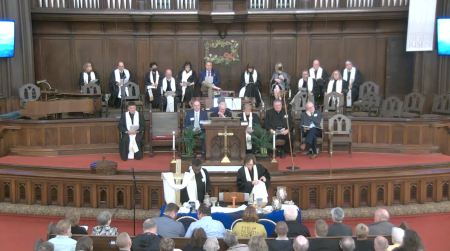UMC conference approves disaffiliation of 264 Tennessee churches

The United Methodist Church continues to experience the impact of its ongoing schism over homosexuality, with the Holston Conference in Tennessee approving the departure of 264 churches from the denomination on Saturday. This comes after the loss of over 1,800 congregations last year.
A special session of the Holston Annual Conference was held at Central United Methodist Church in downtown Knoxville, as 945 members and guests representing both remaining and departing churches gathered to worship and process requests for disaffiliation.
The conference concluded with the launch of a visioning and prayer campaign for the future of the Holston Conference, which will now comprise 578 churches in East Tennessee, Southwest Virginia and North Georgia, the conference said in a statement.
Bishop Debra Wallace-Padgett, resident bishop, acknowledged the significance of the day, stating that the disaffiliating churches and withdrawing pastors have played important roles in the lives of those continuing in the UMC. She emphasized that the conference vote would not change the impact these pastors and churches have had on the denomination.
Over the past several years, the UMC has been embroiled in a divisive debate over whether to change its official stance labeling homosexuality “incompatible with Christian teaching,” which includes a ban on the blessing of same-sex unions and prohibiting noncelibate homosexuals from becoming clergy.
A church law, “paragraph 2553,” set to expire at the end of 2023, allows U.S. congregations to exit with [their] property if they meet specific financial and procedural requirements.
With these latest disaffiliations, 2,095 U.S. congregations have withdrawn from the UMC since 2019, representing roughly 7% of United Methodist churches in the U.S., according to the denomination’s news outlet, which also said the Holston Conference will see its membership drop from 148,580 to 117,378, with 21% of members departing the denomination.
Frustrations over the debate led many conservatives to conclude that it would be better to form their own Methodist denomination or become nondenominational. Last year, the Global Methodist Church officially launched as a theologically conservative alternative to the mainline Protestant UMC. While most of the departing congregations have opted to join the GMC, some have become nondenominational.
After the requests for disaffiliation were approved Saturday, attendees read a paragraph together: “We feel loss in this separation. Yet we feel hope for our different paths forward. We will miss each other’s contributions to the church family. While we know we will all continue to add to God’s Church Universal. We trust that in the power of the Holy Spirit, God will continue to do good work through us in the communities we serve. We ask God’s blessing on each other and on the whole family of God.”
The Rev. Kim Goddard, dean of the cabinet under Wallace-Padgett, spoke about the future of the Holston Conference, emphasizing the potential for a fresh start and renewed faithfulness for the 578 remaining churches.
Bishop Wallace-Padgett expressed confidence in the future of the Holston Conference, stating that it's “strong and robust.” She affirmed that the focus remains on making disciples of Jesus Christ for the transformation of the world.
In some cases, church votes to leave the UMC have been rejected by regional bodies.
In December, the First United Methodist Church of Jonesboro, Arkansas, filed a lawsuit against the Arkansas Conference after the conference voted to reject the church's disaffiliation and suspended its pastor. First UMC was among three congregations that had their disaffiliation voters rejected by the conference in November, although it approved the disaffiliation requests of 35 other congregations.
Last July, over 100 churches filed a lawsuit against the UMC Florida Annual Conference, claiming that it requires departing congregations to pay a "sum of money" to retain control of their church properties.





















